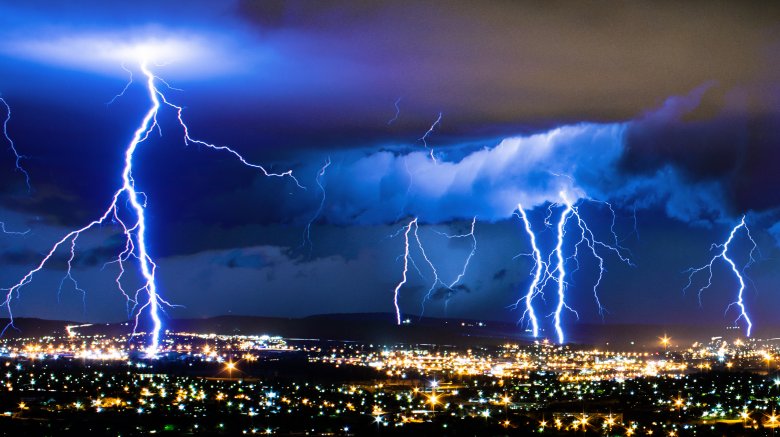What Happens When You Get Struck By Lightning
Rocky Balboa said that nobody hits as hard as life, but he could just as easily have replaced "life" with "lightning." Lightning is nature's haymaker, packing "100 million to a billion volts" of electricity in a single strike, per the National Severe Storms Laboratory. It moves with such blinding speed that the surrounding temperature exceeds 50,000 degrees Fahrenheit. Rocky could probably take a hit like that and keep moving forward, but only because he eats lightning and craps thunder.
For the non-Balboas of the world, getting struck by lightning is less like being pelted with fast food and more like being punched with Thor's hammer. So let's take a look at how Mother Nature's hammerfist works and what would happen if it hit you.
If you've ever been zapped while reaching for a door knob, congratulations — you've basically been struck by pygmy lightning, more accurately known as static electricity. As Live Science explains, static electricity and lightning operate via the same physical principles. When an area has an excess of electrons (negatively charged subatomic particles), those electrons will leap to an area with more protons (positively charged particles) to balance things out. An excess of electrons on a door knob might result in your hand getting zapped, and an excess of electrons in the sky may result in the earth or some unlucky earthling getting struck by lightning.
If lightning strikes you, it will most likely travel over your skin and through your body via your cardiovascular and nervous systems. As Gizmodo outlines, victims can suffer ruptured blood vessels, cardiac arrest, third degree burns, lightning bolt-shaped burns known as Lichtenberg figures, brain damage, memory loss, comas, and obviously death. The severity of various injuries can be worsened if a person holds a metal object or wears metal jewelry. So if you have to go out in a thunderstorm, don't wear a mountain of gold chains like like Mr. T, lest a lightning bolt strikes you harder than Rocky punched Clubber Lang.
On the bright side, an estimated 90 percent of lightning strike victims survive. The National Weather Service reported that between 2009 and 2018, 270 Americans were struck by lightning, resulting in 27 deaths. On the even brighter side, an American's chances of getting struck in their lifetime are 1 in 15,300. On the brightest side, lightning helps keep you alive when it isn't striking you. By releasing the buildup of electrons in the atmosphere, lightning prevents the atmosphere from disappearing and "makes ozone-producing chemicals."
